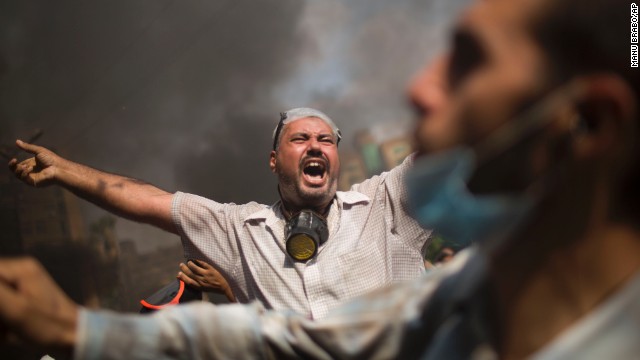
Supporters of ousted Islamist President Mohamed Morsy shout during clashes with Egyptian police at the Rabaah Al-Adawiya protest camp in Cairo's Nasr City district on Wednesday, August 14. Egypt declared a monthlong state of emergency as more than 200 have died and more than 1,400 have been wounded nationwide, according to state TV. Violence began when Egyptian security forces stormed two makeshift camps to clear out Morsy supporters.
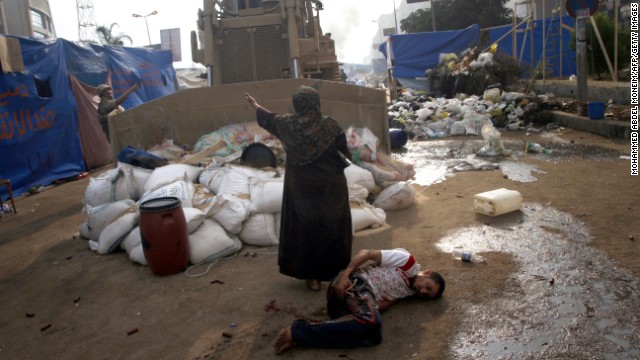 A woman tries to stop a military bulldozer from hurting a wounded youth during clashes on August 14 in eastern Cairo.
A woman tries to stop a military bulldozer from hurting a wounded youth during clashes on August 14 in eastern Cairo.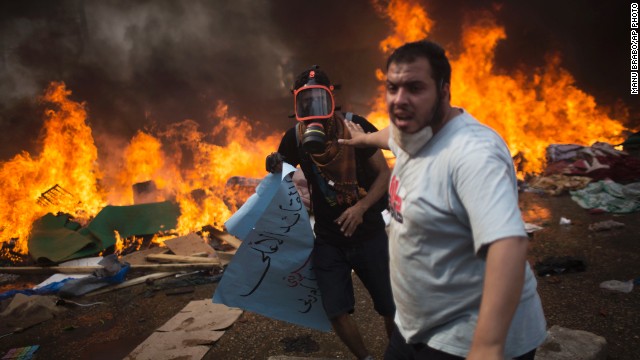 Morsy supporters run as Egyptian security forces fire toward them on August 14.
Morsy supporters run as Egyptian security forces fire toward them on August 14.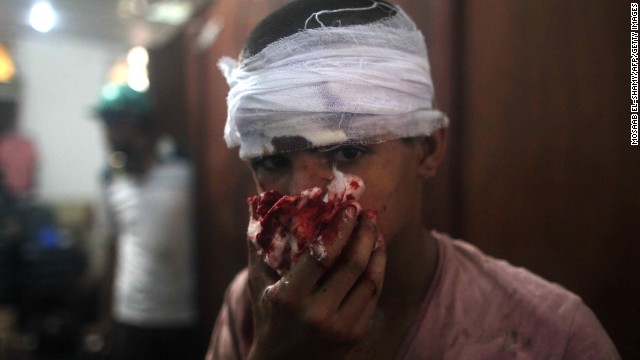 An injured youth is seen at a makeshift hospital in Cairo on August 14.
An injured youth is seen at a makeshift hospital in Cairo on August 14.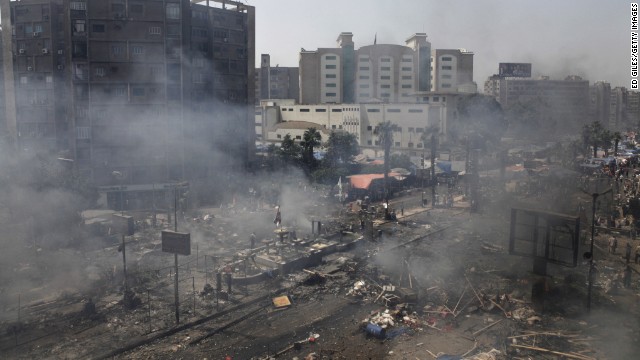 Plumes of smoke rise from the site of a protest in support of deposed President Morsy in Cairo on August 14.
Plumes of smoke rise from the site of a protest in support of deposed President Morsy in Cairo on August 14.Egypt, including its capital Cairo, teetered on the edge early Thursday as clashes persisted following the bloodiest day since the revolution two years ago that was envisioned to bring peace and democracy to Egypt -- but has not.
The violence Wednesday
pitted Egypt's military and current government against backers of
deposed President Mohamed Morsy, though others also were caught in the
fray.
At least 278 people were
killed, including 235 civilians, state TV reported, citing an Egyptian
emergency official. Interim Interior Minister Gen. Mohammed Ibrahim said
that an additional 43 police officers died.
"It's an open war," said a protester who escaped one of two Cairo camps that were raided.
The intensity and
violence lingered into Thursday morning, when state TV reported Morsy
backers were attacking police stations, hospitals and government
buildings despite a government-mandated curfew. More Egyptian troops
were being deployed at entrances to Cairo and Giza, with the unrest
prompting the closure Thursday of banks and the nation's stock market.
The 2011 revolution that
led to the ouster of Hosni Mubarak, who'd kept a firm grip on power for
30 years, was followed by Egypt's first democratic elections. Morsy -- a
leader of the Islamist group the Muslim Brotherhood -- won the
presidency in that 2012 vote, but was forced out by the military last
month.
Morsy hasn't been seen
since he was taken into custody. Yet his supporters have very public in
voicing their opinions, massing on the streets of Cairo and elsewhere to
slam military leaders and demand Morsy's return to the presidency.
Egypt's new government
refused to back down, criticizing elements of the protest movement and
specifically ordering them to leave two spots where they'd been
gathering in Cairo for six weeks, or else they'd force them out.
On Wednesday, they did.
The story of what
exactly transpired -- who attacked whom, who opened fire, who was to
blame -- varied 180 degrees depending on where one stood in the debate
over Egypt's past, present and future.
On the one side, there
were Morsy supporters, one of whom accused government forces of waging a
"full-on assault" on what they said had been, to-date, peaceful
demonstrations. On the other, there were those like Ibrahim, who
professed to being "surprised" by the "Muslim Brotherhood's (decision)
to attack the security forces
What couldn't be
mistaken was the chaos, the bloodshed and the sense -- even with Prime
Minister Hazem Elbeblawi's pledge "we hopefully will rebuild our nation"
-- that the already volatile situation in Egypt could be getting worse.
"I think what we're
seeing right now is just the beginning of what is promising to be a
very, very long and bloody battle as the interim government and the
security forces try to regain control of the streets," CNN's Arwa Damon
reported from Cairo.
The government on
Wednesday, according to state TV, issued a month-long state of
emergency. This a loaded term in Egypt, given that Mubarak long ruled
under such a decree that barred unauthorized assembly, restricted
freedom of speech and let police jail people indefinitely.
The prime minister said
the government felt compelled to act to ensure stability, praising
security forces for their "calm" and claiming some activists had intent
to undermine the government.
"We are here to build a
democracy based on justice," Elbeblawi said. "... We have to reason and
use common sense. We are all part of this nation."
Yet not everyone expressed faith in his government.
Mohammed ElBaradei -- a
secular leader who was one of Morsy's biggest critics before joining the
government that replaced him -- submitted his resignation Wednesday as
vice president of foreign affairs, saying he didn't agree with decisions
being carried out by the ruling government and "cannot be responsible
for a single (drop of) blood." His decision spurred scorn from some
former allies, with youth groups and June 30th coalition members
questioning his stepping down "at this critical and historic phase,"
according to state-run EGYNews.
Kenneth Roth, the
executive director of Human Rights Watch, sharply criticized "ongoing
violence" by Brotherhood supporters against Coptic Christian churches in
the country. He also chastised the government's crackdown on the
Islamist group.
"Didn't have to happen," Roth tweeted. "MB had right to protest. No need for massive lethal force."
The European Union's top
diplomat, Catherine Ashton, urged "security forces to exercise utmost
restraint and ... the interim government to end the state of emergency
as soon as possible, to allow the resumption of normal life."
In light of the ongoing
violence, the United States is considering canceling next month's
planned biennial military training exercise with Egyptian forces, an
official in President Barack Obama's administration said.
Pressing Egypt's
government "to respect basic human rights," U.S. Secretary of State John
Kerry said that Wednesday's "deplorable" events "run counter to
Egyptian aspirations for peace, inclusion and genuine democracy."
"The path toward violence leads only to greater instability, economic disaster and suffering," he said.
Begins at 4pm local time on August 14
Declared by the interim president for a month
Army to help police maintain security
Police can detain people for extended periods of time
Unauthorized assembly barred
Authorities to monitor communications, media
A curfew imposed in Cairo and other provinces
The unpopular state of emergency law was in place in Egypt from 1967 to 2012
It was was lifted after the ouster of President Hosni Mubarak
Morsy's government declared a limited state of emergency in January 2013
For weeks, the two
makeshift Cairo protest camps had become cities unto themselves -- with
people sleeping in tents, vendors hawking everything from haircuts to
masks, and children playing in inflatable castles and splashing in
kiddie pools.
At dawn on Wednesday, they came under siege.
Security forces rushed
in, bulldozing tents and escorting away hundreds. Some mothers and
fathers managed to whisk away their children, gas masks on their faces.
Within three hours, the
smaller camp -- Nahda, near Cairo University -- was clear, except for
shreds of torn-down tents that remained.
But the larger protest,
near the Rabaa al-Adawiya mosque in eastern Cairo, proved trickier.
Facing heavy resistance, the military called in special forces.
Chaos ensued. Along with
smoke, bursts of rapid gunfire filled the air, as did people's wails.
Many protesters refused to leave, even in the face of bulldozers and
surrounded by the injured and dead.
"They said they're prepared to die," CNN's Reza Sayah reported.
State TV reported that
snipers from the Muslim Brotherhood -- Morsy's party -- exchanged
gunfire with Egyptian security forces near a university building.
The dead included
cameraman Mick Deane, who'd worked for UK-based news channel Sky News
for 15 years and for CNN before that. Habiba Abdel Aziz of Gulf News,
who was in Egypt on her own time having celebrated the Eid holiday, also
died, editor-at-large Francis Matthew told CNN.
And Reuters photojournalist Asmaa Waguih was shot and wounded, the news agency told CNN. She was being treated in a hospital.
Ibrahim, the interim
interior minister, claimed armed protesters were the aggressors --
including trying to storm police stations, the Ministry of Finance
building and other targets in Cairo.
The fighting wasn't
limited to the capital. Morsy backers reportedly besieged churches in
Sohag, setting fire to Saint George's Church, a tour bus and a police
car, EGYNews said.
Naguib Sawiris, an
Egyptian billionaire who helped found the anti-Morsy Free Egyptian
Party, said his party had video of Muslim Brotherhood members "shooting
machine guns on civilians, on police. So anyone who wants to call this a
peaceful demonstration would be wrong."
But Ahmed Mustafa, a
Muslim Brotherhood spokesman, told CNN that Sawiris was trying to
misrepresent video of masked people with weapons.
Besides claiming they'd
been shot at, the Muslim Brotherhood also accused police of throwing
Molotov cocktails at makeshift clinics.
Security forces pushed
doctors out of one hospital at gunpoint, a witness said, and a CNN crew
at one point was "literally walking on the blood of the victims."
Yet Ibrahim said
government forces had done what they could to limit casualties, with his
ministry insisting, "Egyptian security forces are committed to the
utmost self-restraint in dealing with the protesters."
Rather than uniting
Egypt after Mubarak's fall, divisions remained rife -- and, in some
ways, intensified -- during Morsy's time as president.
Critics accused him of
being authoritarian, trying to force the Brotherhood's Islamic agenda,
not being inclusive and failing to deliver freedom and justice.
The military coup to
dismiss him, they said, was necessary since Morsy didn't fairly
represent all Egyptians. So, too, were the efforts to force his
supporters off the streets.
"We believe in human
rights," said Shehab Wagih, a spokesman for the Free Egyptian Party
speaking in favor of the military. "But at the same time, we cannot
accept the idea of having a state inside a state."
Morsy's backers,
meanwhile, accuse the military -- and the government it appointed -- of
undermining the people's will, as expressed at the polls. The deposed
president wasn't given a fair chance, they say, and his supporters have
been unfairly targeted for expressing their opinion.
Talking Wednesday on
CNN, Abdul Mawgoud Dardery of the pro-Morsy Anti-Coup National Alliance
blamed "corrupt elements" in the Egyptian army for the bloodshed,
calling their actions a "crime against humanity" and "state terrorism."
"All presidents make
mistakes, but you don't have the army to remove them," Dardery said of
Morsy. "... What are we telling to the rest of the Arab world, the
Muslim world -- that bullets are better than ballots?"
No comments:
Post a Comment